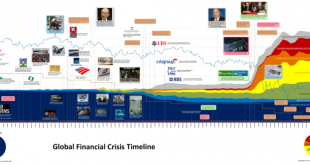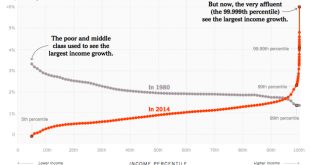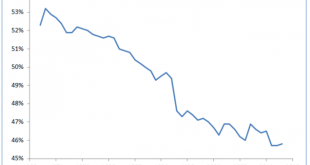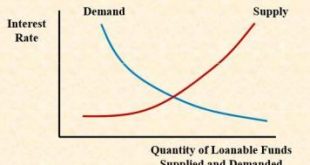from David Ruccio The crisis takes a much longer time coming than you think, and then it happens much faster than you would have thought — Rudi Dornbusch Last week, a wide variety of U.S. media (including the Wall Street Journal and USA Today) marked what they considered to be the ten-year anniversary of the beginning of the global economic crisis—from which we still haven’t recovered. The event in question, which occurred on 9 August 2007, was the announcement by international banking...
Read More »Terry Crouch & Dean Baker – 3 Tunes at the Open Mic
First time playing together in 2+ years.. at the Swiss Bell Open Mic night - 16th August 2017.. forgive the music stand and lyrics! 0.00 Tune 1 - The Light - Original - Dean Baker/Dave Day 4.24 Tune 2 - Nothing Compares - Prince/O'Connor 8.42 Tune 3 - Talk To Me - Original - Dean Baker/Terry Crouch
Read More »Ten years after financial crisis our elites have learned nothing
from Dean Baker Last week, I heard BBC announce the 10th anniversary of the beginning of the financial crisis. This is dated to the decision by the French bank BNP Paribas to prohibit withdrawals from two hedge funds that were heavily invested in subprime mortgage backed securities. According to BBC, this was when lending began to freeze and house prices began to fall. The problem with BBC’s story is that house prices had already been falling for more than a year. While the nationwide...
Read More »‘Adults in the Room’ by Varoufakis. Good, necessary and very frightening.
Yanis Varoufakis has written a book which shows that the European Union is, at present, disfunctional and does not live up to the treaties. The EU treaties are clear: “The Union shall establish an internal market. It shall work for the sustainable development of Europe based on balanced economic growth and price stability, a highly competitive social market economy, aiming at full employment and social progress, and a high level of protection and improvement of the quality of the...
Read More »Krugman and Mankiw on loanable funds — so wrong, so wrong
from Lars Syll A couple of years ago — in a debate with James Galbraith and Willem Buiter — Paul Krugman made it perfectly clear that he was a strong believer of the ‘loanable funds’ theory. Unfortunately, this is not an exception among ‘New Keynesian’ economists. Neglecting anything resembling a real-world finance system, Greg Mankiw — in his intermediate textbook Macroeconomics — more or less equates finance to the neoclassical thought-construction of a ‘market for loanable funds.’ On...
Read More »Broken
from David Ruccio Over the years, I’ve reproduced and created many different charts representing the spectacular rise of inequality in the United States during the past four decades. Here’s the latest—based on the work of Thomas Piketty, Emmanuel Saez, and Gabriel Zucman—which, according to David Leonhardt, “captures the rise in inequality better than any other chart or simple summary that I’ve seen.” I agree. The chart shows the different rates of change in income between 1980 and...
Read More »The fall of the US middle class
from Steve Pressman As the rich received a bigger piece of the pie, everyone else got relatively less. We can see this in the falling share of income going to the middle-three income quintiles (Figure 1). One standard economic argument for great inequality is that it generates incentives to make money and contributes to economic growth, which increases average living standards. Even if this is true, not everyone benefits from growth. Saez and Piketty (2013) estimate that since the late...
Read More »The loanable funds hoax
from Lars Syll The loanable funds theory is in many regards nothing but an approach where the ruling rate of interest in society is — pure and simple — conceived as nothing else than the price of loans or credits set by banks and determined by supply and demand — as Bertil Ohlin put it — “in the same way as the price of eggs and strawberries on a village market.” It’s a beautiful fairy tale, but the problem is that banks are not barter institutions that transfer pre-existing loanable...
Read More »“We’ve got the robots”
from David Ruccio [ht: ja] describes the arrival of the first robots at Tenere Inc. in Dresser, Wisconsin: The workers of the first shift had just finished their morning cigarettes and settled into place when one last car pulled into the factory parking lot, driving past an American flag and a “now hiring” sign. Out came two men, who opened up the trunk, and then out came four cardboard boxes labeled “fragile.” “We’ve got the robots,” one of the men said. They watched as a forklift...
Read More »The Zika Vaccine: The miracle of government-funded research
from Dean Baker The prescription drug industry ranks as one of the most dysfunctional sectors of the US economy. Martin Shkreli has made himself a celebrity as the “pharma bro”: a hedge fund boy who jacked up prices on drugs produced by a company he controlled by more than 5,000 percent. Unfortunately, this sort of pricing is typical of the industry, even if most companies tend to be a bit less flamboyant in profiting off patients than Mr. Shkreli. The underlying problem is that drug...
Read More » Real-World Economics Review
Real-World Economics Review







